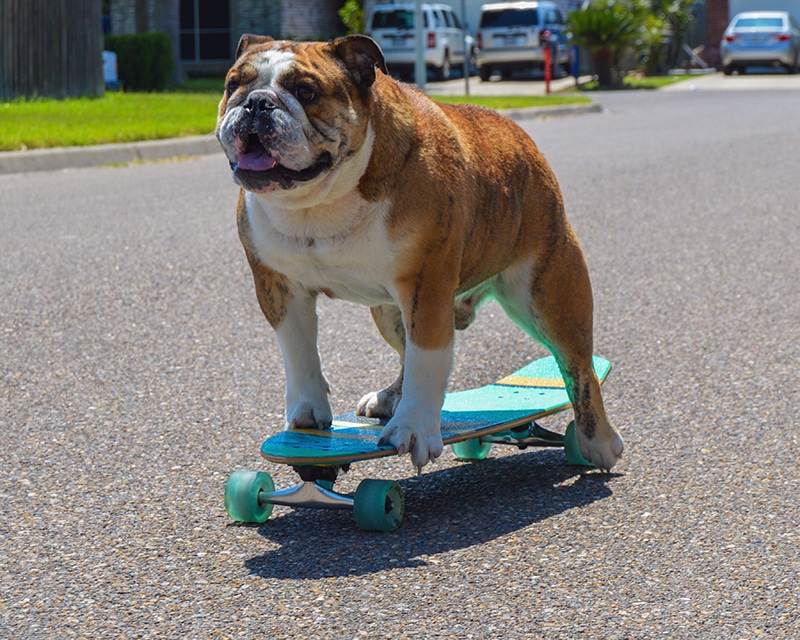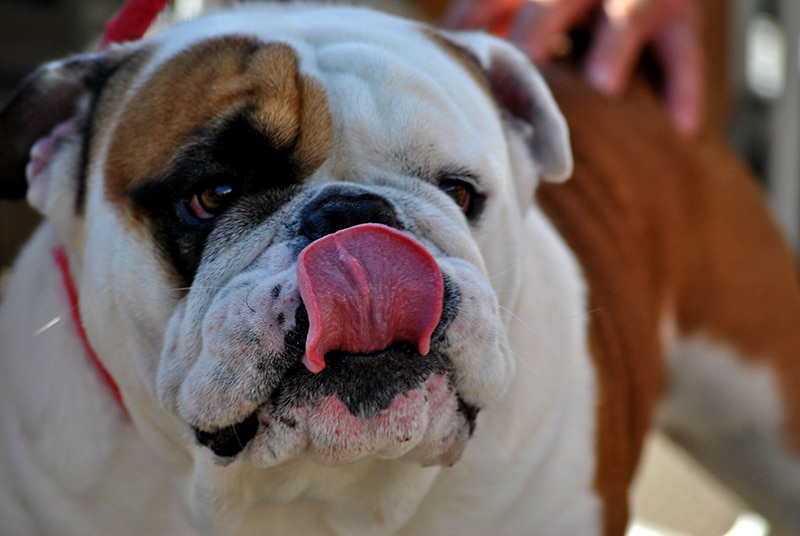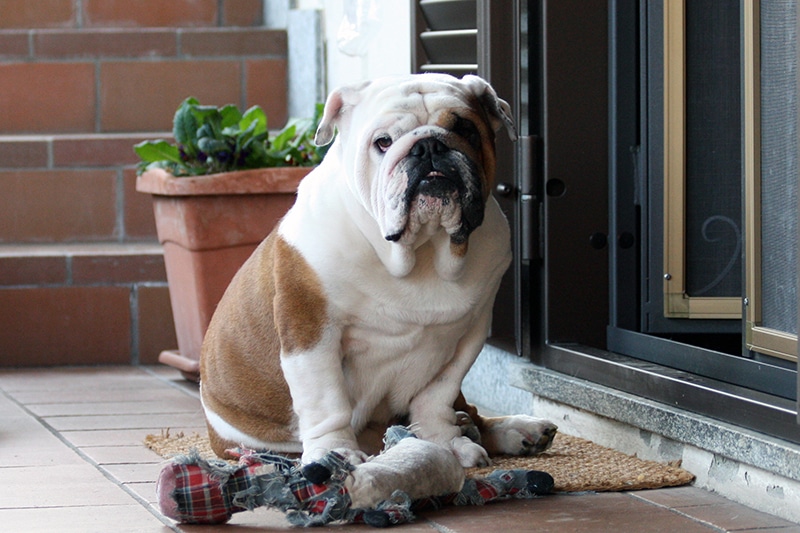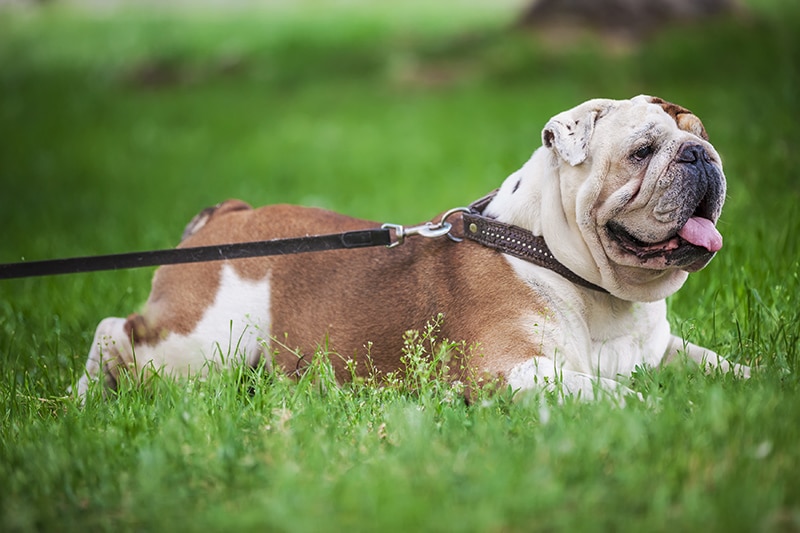Is Turkey and Rice Kibble Substantial for a Springer Spaniel or Does He Need Lamb or Beef
Picking the best dog food for your Bulldog can be a challenging task. As you probably know, a Bulldog is a greedy eater who can easily gain weight if her diet is unbalanced. Therefore, you have to make plenty of decisions, from considering Fido's life stage and health requirements. To ensure that she gets all the proper nutrients from the highest quality sources, all of this with the abundance of information might be overwhelming.
I used my 12 years of Veterinary experience and reviewed over 30 dog food products to find the best dog food for Bulldogs.
After considering the nutritional needs along with genetic health conditions that Bulldogs tend to have, I found that "Canidae Life Stages Dog Food" is the best overall food for adult Bulldogs. In addition to meeting my dietary criteria for Bulldogs, it has the best combination of nutrients and quality sources.
But I understand that no two Bulldogs are alike, and your Bulldog might have a different life stage or have different needs. That's why I prepared a shortlist of the best Bulldog foods that address the most common Bulldog needs.
In addition to picking the best products for your pooch, I outlined my process for choosing dog food. I want you to know what gets inside the furry stomach. The process is written in plain & simple English that will help you make wiser dietary decisions for your Bulldog.
I encourage you to read our review process and check out our in-depth reviews below so that you'll be able to come up with your own dietary decisions.
Let's get started.
Before You Pick The Best Food For Your Bulldog

There's no such thing as one food that fits all Bulldog. While I did my best to find the best food for most Bulldogs, you might prefer to pick a more specific formula.
That's why I elaborate here our main considerations while reviewing the best dog foods for Bulldogs.
You can divide your research journey into 3 steps:
- First, pick the right food for your Bulldog's life stage – Puppies, Adults, and Senior Bulldogs are in different development stages. Their joints, bones, and muscles develop at a different pace. That's why you'll need to pick the proper nutrients in the correct quantity for your Bulldog's life stage.
- Picking the right food to reduce common Bulldog health issues – Each dog breed has an increased risk of catching certain health conditions. These health conditions are genetic, and Bulldogs are not indifferent. So make sure to pick the right ingredients to support common Bulldog health issues.
- Picking suitable nutrient sources – Sometimes, two dog foods might seem similar. Both could provide the same nutritional value. However, it's essential to question how these nutrients were sourced. We want to avoid chemicals and low-quality nutrients that can introduce some side effects.
The rest of the guide will show you how to pick the right food for your Bulldog's life stage, how diet helps in common Bulldog health issues, and what to look for on the label.
For your convenience, I (Dr. Libby Guise) shortlisted 12 dog foods. These foods were carefully selected and should satisfy your Bulldog's needs. I also noted which food is best for certain life stages or particular health issues.
After going through the shortlist, you can find additional considerations that might be of interest to you and your fur-baby.
Finally, I answered the most popular questions that I'm being asked regarding Bulldogs' nutrition and diet.
Please keep in mind, while I tried to do my best to find the best food for your Bulldog, it would be a good idea to understand how and why we made our decisions.
The recommendations in this review are not intended to replace the doctor-patient relationship. Always consult your veterinarian before making significant adjustments to your furbaby's diet.
The Right Diet For All Life Stages

With their stocky frame, wrinkled skin, and friendly personality, bulldogs make popular family pets. They're fun-loving, easy to care for, and easy to train, but they do have some health issues.
Bulldogs have a flat face and undershot jaw that's characteristic of brachycephalic breeds, and that sets them up for some breathing problems. As a result of their heavy muscling and airway challenges, these pups tend to be exercise intolerant and prone to overheating. The breed also has tendencies for obesity and food allergies.
With this list of health concerns, you can probably see why nutrition is so important for bulldogs. When planning a healthy diet for your pooch, start with high levels of quality, animal-based protein such as poultry, meat, and fish. Adult dogs should have food with at least 18% protein (puppies at least 22%).
Another key macronutrient for your furbaby is fat. Because bulldogs aren't working or sporting dogs, they should have low to moderate levels of fat. Puppies will need a moderate amount to help fuel their growth. As with protein, look for animal-based sources that provide essential fatty acids including omega fatty acids to provide energy, promote immunity, and support nutrient absorption.
While bulldogs need some carbohydrates in their diet, look for foods with lower levels of this macronutrient. Pick products with easily digestible materials such as whole grains, potatoes, beans, and legumes. Target 5% or less crude fiber.
Your pup will also need a balanced blend of vitamins and minerals. Fruits and vegetables are excellent natural sources for these essential nutrients.
Daily Calorie Requirements
Bulldogs are medium-breed dogs that average between 40-50 pounds as adults. The average daily caloric need for dogs is about 25-30 calories per pound. Because bulldogs are lower activity animals, you may want to go target the lower number as a starting point.
- Less active adults should need about 1150 calories
- More active adults will need around 1300 calories
- Seniors need about 950 calories
Puppies generally need about double the calories per pound as an adult dog to fuel their growth and higher energy levels.
Feeding Quantity & Frequency
The volume of food that you feed your dog will depend on their age, weight, and the food you're using. Generally, the amount will range between ½ cup for young puppies to 2 cups per day for active adults. However, use the package guidelines and calorie count per cup as a starting point. You can adjust the amount up or down if your pal is losing or gaining weight.
When it comes to feeding frequency, younger animals should have more meals throughout the day to provide a consistent energy supply.
- Puppies – as puppies first switch from nursing to eating solid food, you should divide their daily food into 3-4 equal meals per day. Around 6 months, you can transition to twice a day.
- Adults and Seniors – around one year, bulldogs can gradually switch to adult food. We recommend continuing to feed adults and seniors two times per day.
The Appropriate Nutrition For Common Bulldog Health Issues

Some health conditions are more popular among Bulldogs than other dog breeds. Each breed inherits some genes that can be associated with certain health issues.
It doesn't mean that Fido is going to develop these conditions. It just means that Bulldogs have a higher chance as compared to other breeds.
However, it's possible to reduce the risk by proactively feeding bulldogs with the proper nutrients. Here we list the most common Bulldogs health issues and how certain nutrients can reduce risk.
A quick reminder: if you think your special pal suffers from any of these conditions, schedule an exam with your veterinarian to confirm your suspicions. Even with healthy dogs, these dietary recommendations may help prevent future problems. Always check with Fido's doctor before making changes in his diet.
Eye Problems
Bullies have predispositions for several eye problems that may affect their vision later in life including cherry eye, cataracts, distichiasis, entropion, and tear stains. Many of their ocular issues are related to the bulldog's flat face and shallow eye sockets that can trap dust and debris. Your first line of defense is daily eye care and cleaning around the face. Watch for any signs of discharge or tearing that may be a sign of infection or disease.
No matter what eye condition your pup faces, proper nutrition can play a supportive role in eye health. Choose foods with quality whole-food ingredients such as:
- Dark green vegetables like kale, spinach, and broccoli have phytonutrients
- orange/yellow-orange vegetables including pumpkin and carrots to supply beta carotene
- Oily fish like sardines and salmon for omega fatty acids
- Berries and other antioxidant-rich fruits
Joint Problems
With their massive stature and stocky legs, bulldogs tend to suffer from the hereditary joint conditions of hip dysplasia and patellar luxation. These diseases involve abnormal development of the respective hip or knee joint that causes the bones to rub against the cartilage. The extra friction leads to joint damage, inflammation, and pain.
Some important nutrients can help pups with joint disease. Look for foods that include glucosamine and chondroitin to provide support for joint mobility and cartilage health. Products that also contain omega fatty acids can help to manage inflammation.
Sensitive Skin
Bulldogs are prone to skin infections and sensitivities.
- Eczema is a very common condition for these pups and may be caused by bug bites, food allergies, or environmental irritants. The result is dry, itchy skin or rashes.
- Fold dermatitis happens when bacterial infections develop between the Bulldog's skin folds. You can help prevent this by checking your pal daily to make sure his skin is clean and dry.
Some key nutrients that can help promote healthy skin include omega fatty acids, vitamin E, and antioxidants. Look for products with whole fruits, vegetables, and oily fish like salmon or sardines. You should also avoid common allergens such as corn, wheat, soy, or artificial additives.
Obesity
Obesity is particularly problematic for bulldogs because they're a brachycephalic breed. The added pounds can put extra pressure on their airways as well as their joints. And with their stocky build, the extra bulk can interfere with their ability to scratch themselves.
It can be hard to tell if a bully is overweight, but here's a tip: your pooch's waist should be slightly narrower than his hips. If your pup is obese, you should look for a diet that's lower calorie and contains quality ingredients. Try feeding smaller, more frequent meals throughout the day.
Breathing Problems
Bulldogs suffer from a condition known as Brachycephalic Airway Obstruction Syndrome (BAOS). The anatomy that causes the shortened nose and flat face includes:
- A soft palate that's too long
- A narrow trachea and larynx
- Narrow nostrils
Combined, these hereditary defects cause breathing difficulty, snoring, exercise intolerance, heat intolerance, and possible fainting.
Dietary support for BAOS involves keeping your pooch on a quality diet that promotes healthy weight management. Choose products with a higher protein, lower fat, and lower carb content. Other beneficial materials include ingredients that provide rich sources of antioxidants and omega fatty acids. Because allergies can increase airway inflammation and breathing difficulty, avoid common allergens like corn, dairy, gluten, and wheat.
Food Allergies
If your pooch has year-round itchy skin or ear infections and ongoing gastrointestinal issues, he may have a food allergy. The most common food allergens for bulldogs are usually protein-based. The top culprit is chicken followed by beef and fish. However, some bullies also suffer from corn, dairy, wheat, or soy.
If you suspect your pup has a food allergy, consult with your veterinarian. You may be able to run a food elimination trial to identify the root cause. Otherwise, focus on products with quality novel proteins such as rabbits. Pick food with limited ingredients including whole grains like sorghum and quinoa and antioxidant-rich garden vegetables and fruit. Probiotics are also beneficial to soothe the gut.
Ensuring High-Quality Nutrients

Now that you have information about the basic nutritional needs of Bulldogs and how to adjust their diets to prevent some common health conditions, we need to ensure that the nutrient sources are best of class.
- Kibble Size – For a bulldog, kibble size is important because of its shorter mouth and flat face. Pick food designed for medium-size breeds. Larger chunks may be too difficult for a bully to chew.
- Age Appropriate – Puppies have different needs than full-grown dogs. Make sure you choose food that's designed for your bully's age and life stage.
- The First Ingredient is Whole Protein – Quality sources of lean protein are the most important part of your bully's diet. Look for chicken, salmon, turkey, or other animal proteins at the top of the ingredient list.
- Contains Minimal to Moderate Fat – Fats are an important part of your pup's diet. Healthy, animal-based sources of fat provide essential fatty acids to support the skin, coat, and brain. Look for fat content in the low to moderate range around 12-16%.
- Sensitivity – If your pooch struggles with food sensitivities or allergies, choose quality products that include:
- Vitamin E and omega fatty acids to promote skin and coat health
- Antioxidant-rich garden vegetables and fruits for cellular health
- Probiotics to soothe the gut
- You should also avoid artificial ingredients and common allergens like chicken, corn, dairy, soy, and wheat.
- Focused on Limited Ingredients – If your pooch suffers from sensitivity or food allergies, products with limited ingredients may help you avoid problem materials. Look for formulas that focus on about 6-8 whole-food ingredients and don't include fillers, artificial ingredients, or common allergens.
- Comprised of Easily Digestible Ingredients – If your pup has a sensitive gut, offer a diet that has easy-to-digest materials. Look for lean animal proteins, garden vegetables, fruits, and whole grains that are easy on the stomach.
- Enriched with Helpful Supplements – To support your pup's overall health, look for supportive supplements:
- Probiotics to soothe the gut and aid digestion
- Glucosamine and chondroitin for cartilage health and joint mobility
- Antioxidants for cellular health
- Omega fatty acids support the brain, coat, and skin and help fight inflammation
- The proper balance of calcium and phosphorus for strong bones
- Ingredients to Avoid – Avoid products that contain meat and animal derivatives and poultry by-products. These materials may include items such as feathers, hooves, and lungs which are of no nutritional value for your pup. You should also choose food that has no cereals, corn, or soy.
- Free From Chemical Preservatives – Many chemical food preservatives have been linked to cancer. Avoid products that include propylene glycol, BHA, BHT, ethoxyquin, or nitrates/nitrites. Look for food that relies on natural preservatives like tocopherols and herbs.
- Has No Artificial Ingredients – Like chemical preservatives, some artificial colors and flavors are linked to health issues including cancer. Choose products that have all-natural ingredients.
- Complies With AAFCO Requirements for Complete and Balanced Dog Food – The AAFCO provides regulatory agencies with nutritional recommendations for pet foods. Check the product information for a statement to indicate the product meets AAFCO requirements.
- Made in a Handful of Countries – To have greater confidence that your pal's food is wholesome, choose products that are made in a country that follows good manufacturing practices. Trusted nations include the United States, Canada, The United Kingdom, and New Zealand.
Our 2022 Review For 12 Dog Foods For Bulldogs

We reviewed over 100 products by following the process presented above and classified the best of them based on everyday Bulldog needs.
We considered the life stage, common Bulldog health issues for each pick and ensured it has the best nutrient sources.
Canidae Life Stages Dog Food
- First 5 ingredients: Chicken Meal, Turkey Meal, Lamb Meal, Brown Rice, White Rice
- Key feature: High protein, lower fat
- Guaranteed Analysis: 24% Crude Protein,14.5% Crude Fat,4% Crude Fiber, 10% Moisture
- Caloric Content: 468 kcal/cup
- Type of Product: Dry dog food
- Life Stage: All Stages
- Best for: Best Overall Pick
- AAFCO Statement: formulated to meet the nutritional level established by AAFCO Dog food nutrient profile for maintenance
Starting with three sources of animal protein, this food offers the essential amino acids your bully needs to maintain lean muscle mass. The fat content includes omega 3 and 6 fatty acids for healthy skin, coat, and brain.
Digestible whole grains, fruit, and alfalfa provide phytonutrients, antioxidants, and essential vitamins and minerals for your pooch's health. Natural sources of digestive enzymes combine with a probiotic cocktail and prebiotic fiber to promote digestion.
This food is free of common food allergens like gluten, corn, soy, and wheat. There are no artificial ingredients or fillers in the formula.
Customers say their dogs like the flavor and have fewer poops when they eat this food.
Diamond Naturals Senior Formula Dry Dog Food
- First 5 ingredients: Chicken, Chicken Meal, Whole Grain Brown Rice, Ground White Rice, Egg
- Key feature: natural ingredients
- Guaranteed Analysis: 25% Crude Protein,11% Crude Fat,3% Crude Fiber, 10% Moisture
- Caloric Content: 318 cal/cup
- Type of Product: Dry food
- Life Stage: Seniors
- Best for: Budget
- AAFCO Statement: formulated to meet the nutritional needs established by the AAFCO Dog Food Nutrient Profiles for maintenance
With chicken and chicken meal as the first two ingredients on the list, this food offers essential amino acids for your pal's muscles. The fat content is an appropriate level for senior or adult bulldogs with normal activity levels.
The formula includes natural sources of glucosamine and chondroitin for joint health. There's a balanced blend of essential vitamins and minerals including calcium and phosphorus for strong bones.
Digestible whole grains, fruits, and vegetables offer sources of antioxidants and digestible fiber. For digestive health, the formula includes chicory root as a source of prebiotic fiber and at least 80 million CFU/pound of probiotic microorganisms.
Satisfied customers say this food helps their animals thrive and offers affordable quality nutrition.
Wellness Complete Health Puppy
- First 5 ingredients: Deboned Chicken, Chicken Meal, Oatmeal, Ground Barley, Peas
- Key feature: High protein, moderate fat for growth
- Guaranteed Analysis: 29% Crude Protein,18% Crude Fat,4.5% Crude Fiber, 10% Moisture
- Caloric Content: 450 kcal/cup
- Type of Product: Natural ingredient dry dog food
- Life Stage: Puppy
- Best for: Bulldog Puppies
- AAFCO Statement: formulated to meet the nutritional level established by AAFCO Dog food nutrient profile for growth and gestation/lactation
The first two ingredients on the label are animal proteins to provide essential amino acids for your puppy's growth and development. The formula includes a moderate-high fat content from chicken fat and other healthy sources of essential and omega fatty acids including DHA for brain development.
With digestible whole grains, vegetables, and fruits, the formula offers a rich blend of vitamins, minerals, and antioxidants for whole-body health. There's a balanced blend of calcium and phosphorus for strong bones.
This product includes natural sources of glucosamine and chondroitin for joint mobility. Prebiotic fiber and probiotics encourage healthy digestion.
Owners who use the food say the protein and mineral content help power rapid growth and strong bones and muscles.
Nutro Wholesome Essentials Adult
- First 5 ingredients: Chicken, Brewers Rice, Chicken Meal, Whole Grain Brown Rice, Whole Grain Barley
- Key feature: high protein, moderate fat
- Guaranteed Analysis: 22% Crude Protein, 14% Crude Fat,3.5% Crude Fiber, 10% Moisture
- Caloric Content: 343 kcal/cup
- Type of Product: Natural Dry Dog Food
- Life Stage: Adult
- Best for: Adult Bulldogs
- AAFCO Statement: formulated to meet the nutritional level established by AAFCO Dog food nutrient profile for maintenance
Starting with real chicken as the first ingredient, this food offers rich protein sources to power your bulldog's muscles. The fat content is appropriate for an active pooch and includes omega fatty acids for the coat, brain, and skin.
Healthy whole food ingredients include garden vegetables such as pumpkin and spinach to provide phytonutrients, antioxidants, and other essential nutrients. With digestible materials and prebiotic fiber, this formula is made to be gentle on the gut.
The chicken meal provides natural sources of glucosamine and chondroitin to support joint mobility. There are no artificial ingredients or fillers in the food.
Owners report their dogs like to eat this food and it helps keep the skin and coat healthy.
Chicken Soup for the Soul Mature Chicken, Turkey & Brown Rice Recipe
- First 5 ingredients: Chicken, Turkey, Chicken Meal, Turkey Meal, Cracked Pearled Barley
- Key feature: high protein, low fat
- Guaranteed Analysis: 23% Crude Protein,12% Crude Fat, 5% Crude Fiber, 10% Moisture
- Caloric Content: 374 kcal/cup
- Type of Product: Dry Food
- Life Stage: Mature
- Best for: Senior Bulldogs
- AAFCO Statement: formulated to meet the nutritional needs established by the AAFCO Dog Food Nutrient Profiles for Maintenance
This product is packed with lean animal proteins to help your senior maintain lean muscle mass. With a low-moderate fat content featuring sources of omega and other essential fatty acids, this formula provides the right level of energy and nutrients for the brain, coat, and skin health.
The chicken and turkey meals provide natural sources of glucosamine and chondroitin to support cartilage health and joint mobility. There's a balanced blend of vitamins, minerals, and antioxidants to support total body health.
With digestible ingredients from whole grains, fruits, and vegetables, this food is designed to be gentle on the gut. The formula also has sources of prebiotic fiber and probiotics to stimulate digestion. Taurine is included for heart health and L-carnitine is included to support the metabolism.
Customers report that their dogs like the food, and it helps pups stay more active and keep the weight down.
Blue Buffalo Life Protection Formula Healthy Weight Adult
- First 5 ingredients: deboned chicken, chicken meal, brown rice, barley, pea fiber
- Key feature: Moderate protein, lower fat for weight loss and maintenance
- Guaranteed Analysis: 20% Crude Protein,9% Crude Fat,10% Crude Fiber, 10% Moisture
- Caloric Content: 326 kcal/cup
- Type of Product: Weight control dry dog food
- Life Stage: Adult
- Best for: Weight Loss
- AAFCO Statement: formulated to meet the nutritional level established by AAFCO Dog food nutrient profile for maintenance
This food features lean animal protein as the first two ingredients to support your dog's lean muscle mass. The low protein content comes from healthy animal-based sources to provide essential fatty acids including omega fatty acids.
With L-carnitine to help boost the metabolism and digestible whole foods, this product offers a balanced blend of antioxidants, minerals, and vitamins to support your pal's overall health. Prebiotic fiber from chicory root and probiotic microorganisms aid healthy digestion.
The formula includes the right balance of calcium and phosphorus for strong bones. Natural sources of glucosamine and chondroitin foster joint mobility and cartilage health to keep your pup active.
Owners share that their pups like the flavor, and feeding this product helps them lose weight at a healthy rate.
Wellness Simple L.I.D. Lamb & Oatmeal Formula
- First 5 ingredients: lamb, lamb meal, oatmeal, peas, ground rice
- Key feature: Moderate protein, lower fat for weight loss and maintenance
- Guaranteed Analysis: 21% Crude Protein,12% Crude Fat,4.75% Crude Fiber, 11% Moisture
- Caloric Content: 406 kcal/cup
- Type of Product: Limited Ingredient dry dog food
- Life Stage: Adult
- Best for: Sensitive Stomach
- AAFCO Statement: formulated to meet the nutritional level established by AAFCO Dog food nutrient profile for maintenance
Featuring lamb and lamb meal as the top two ingredients, this product offers essential amino acids to power your bully's muscles. The fat content is suitable for your pup's energy levels and includes omega fatty acids for skin, coat, and to manage inflammation.
With limited ingredients, the formula features digestible materials that are designed to be gentle on the gut. There are prebiotic fiber and natural sources of probiotics to soothe the stomach and aid in digestion.
This food has no artificial ingredients, GMOs, or meat by-products. It's also free of dairy, eggs, corn, wheat, and soy.
Owners report that this food is easy on the gut and also helps to reduce sensitive skin issues.
FirstMate Pacific Ocean Fish Meal Original Formula L.I.D.
- First 5 ingredients: Ocean Fish Meal, Burbank Potato, Norkotah Potato, Tomato Pomace, Chicken Fat
- Key feature: Limited ingredient food
- Guaranteed Analysis: 23% Crude Protein,10% Crude Fat,8% Crude Fiber, 10% Moisture
- Caloric Content: 484 kcal/cup
- Type of Product: Dry Food
- Life Stage: Adults
- Best for: Skin Allergies
- AAFCO Statement: formulated to meet the nutritional level established by AAFCO Dog food nutrient profile for maintenance of adult dogs
This limited ingredient formula features fish from the herring family as the single protein source. The low-fat content includes rich sources of omega fatty acids to support healthy skin.
With digestible carbohydrates and a balanced blend of essential nutrients, this food offers suitable energy for a bulldog's activity level. There's an appropriate balance of calcium and phosphorus for strong bones.
This formula includes glucosamine for joint mobility. It's grain-free and manufactured in Canada using trusted sources.
English Bulldog owners say feeding their furbabies this food helped to eliminate stinky poop and yeast infections on the paws and skin.
Earthborn Holistic Venture Limited Ingredient Grain-Free
- First 5 ingredients: Rabbit Meal, Pumpkin, Tapioca, Alaska Pollock Meal, Sunflower Oil
- Key feature: Holistic limited ingredient food
- Guaranteed Analysis: 26% Crude Protein,13% Crude Fat,6% Crude Fiber, 10% Moisture
- Caloric Content: 335 kcal/cup
- Type of Product: Dry Food
- Life Stage: Adults
- Best for: Allergies
- AAFCO Statement: formulated to meet the nutritional level established by AAFCO Dog food nutrient profile for maintenance of adult dogs
This product uses rabbit meal as a single protein source to help prevent allergic reactions. The moderate fat content provides essential fatty acids including the omegas and DHA to support skin, coat, and brain health.
With limited ingredients, there are no grains, gluten, GMO materials, or common allergens in the formula. The product includes taurine and methionine for heart health.
There are probiotic cultures and prebiotic fiber in the product to support gut health. The formula includes a balanced blend of minerals and vitamins.
Customers say feeding this product to their dogs helps to decrease allergy symptoms.
Merrick Real Texas Beef + Sweet Potato Recipe Grain-Free
- First 5 ingredients: Deboned Beef, Lamb Meal, Salmon Meal, Sweet Potatoes, Potatoes
- Key feature: high protein, moderate fat
- Guaranteed Analysis: 34% Crude Protein,15% Crude Fat,3.5% Crude Fiber, 11% Moisture
- Caloric Content: 379 kcal/cup
- Type of Product: Grain-Free Dry Dog Food
- Life Stage: Adult
- Best for: Joint Health
- AAFCO Statement: formulated to meet the nutritional needs established by the AAFCO Dog Food Nutrient Profiles for Maintenance
Starting with real beef, this food provides essential amino acids for strong, healthy muscles to support joint stability. The lamb and salmon meals also contribute omega fatty acids, glucosamine, and chondroitin to help manage inflammation and promote joint mobility.
Digestible garden produce and fruits provide rich sources of antioxidants, minerals, and vitamins for cellular and whole-body health. The formula includes a balance of calcium and phosphorus for strong bones.
A combination of prebiotic fiber and probiotics promotes gut health and digestion. There are no grains or artificial ingredients in the food.
One bully parent shared that feeding this food helped their pup's coat and mobility.
American Journey Beef & Sweet Potato Recipe Grain-Free Dry Dog Food
- First 5 ingredients: Deboned Beef, Chicken Meal, Turkey Meal, Peas, Chickpeas
- Key feature: High-protein, moderate fat
- Guaranteed Analysis: 32% Crude Protein,14% Crude Fat,5% Crude Fiber, 10% Moisture
- Caloric Content: 380 kcal/cup
- Type of Product: Grain-free dry dog food
- Life Stage: Adult
- Best for: Grain-free
- AAFCO Statement: formulated to meet the nutritional levels established by the AAFCO Dog Food Nutrient Profiles for maintenance
Starting with animal protein in the top three ingredients, this food offers a rich source of essential amino acids to promote lean muscle mass. The fat content includes omega and other essential fatty acids to foster healthy skin, coat, and brain.
Wholesome garden vegetables and fruits provide rich sources of antioxidants, vitamins, phytonutrients, and minerals to support your pup's whole body health. Chickpeas and sweet potatoes provide the energy your bully needs for daily activity.
The formula includes probiotics and prebiotic fiber to promote healthy digestion. There are no artificial ingredients, fillers, or grains in this food.
Customers report their dogs love the beef flavor, coats are shiny, and pups have lots of energy.
Wellness CORE Grain-Free Weight Management Formula
- First 5 ingredients: Chicken, Chicken Broth, Turkey Broth, Pork Liver, Whitefish
- Key feature: Protein-rich, grain-free
- Guaranteed Analysis: 11% Crude Protein, 3.5% Crude Fat, 2% Crude Fiber, 78% Moisture
- Caloric Content: 319cal/can
- Type of Product: Wet adult food
- Life Stage: Adult
- Best for: Canned Food
- AAFCO Statement: formulated to meet the nutritional needs established by the AAFCO Dog Food Nutrient Profiles for maintenance
With real chicken as the first ingredient in this food, your pup will have a protein-rich diet to power his muscles. The moderate fat content provides energy and essential nutrients including omega fatty acids to promote healthy skin, coat, and brain.
The digestible ingredients include fruits and garden vegetables that provide antioxidants, phytonutrients, minerals, and vitamins for your pup's health. Prebiotic fiber helps to support gut motility.
Chicken meal in the formula offers a natural source of glucosamine and chondroitin for joint mobility. There are no artificial ingredients or chemical preservatives in the product.
Owners say their dogs love the flavor, and it helps them keep a healthy weight.
Foods That a Bulldog Should Not Eat
While there are many human foods that bulldogs can eat, there are also some foods that are not safe to feed your pooch.
- Grapes and raisins
- Coffee, tea, or other caffeinated drinks
- Kale
- Dairy products like milk and ice cream
- Cooked bones
- Uncooked pork and poultry
- Alcohol
Is Grain-Free a Good Option for Bulldogs?
Grain-free diets are a popular choice for health-conscious dog owners, but are they the right choice for your bulldog? Some proponents claim that dogs can't digest grain or that these ingredients are always the cause of food allergies. But neither of these claims is true.
What's more, in 2018, the FDA released a report about a potential link between grain-free diets and a heart disease known as dilated cardiomyopathy (DCM). To date, this relationship hasn't been proven, but additional studies are underway. Preliminary findings suggest that multiple factors may need to combine to trigger DCM in dogs. It appears most of the cases can be traced to a boutique or specialty food with an exotic protein source that is also grain-free (BEG diets).
The bottom line here is that unless grain-free food is recommended by your pup's doctor, you can feed products that contain quality whole grains. As a matter of fact, they provide dietary fiber and other nutritional benefits. If your pooch is currently on a grain-free diet, don't make any changes without consulting your veterinarian. According to Lisa M. Freeman, DVM, Ph.D. at Tufts, most dogs on BEG diets will not develop DCM. However, pooches on these diets should be checked and monitored for any signs.
Frequently Asked Questions

How do I change my Bulldog's diet?
Whenever you make a diet change, you should do so gradually over about a week:
Start by mixing 25% of the new food with 75% of the current product for two days. On day 3, feed a 50/50 mix. By day 5, you can offer a 75/25 mix. Then, at the end of the week, you're ready to feed 100% new food.
Do Bulldogs need special dog food?
Bulldogs do not require a formula that's specially formulated just for bulldogs. Look for foods for medium-breed dogs that contain high protein and low to moderate fat.
What do I do if my Bulldog is not eating?
Dogs, like people, can lose their appetite for a variety of reasons. If your pup skips a meal or two, he may just have an upset tummy from something. However, if he refuses to eat for more than a day, you should contact your veterinarian. There may be a serious condition that needs attention.
Do Bulldogs have a sensitive stomach?
Bulldogs can suffer from food sensitivities. It's best to pick foods that have easily digestible ingredients and probiotics that support the gut.
What Foods Are Bulldogs Allergic To?
The most common food allergens for bulldogs are chicken, followed by beef, fish, and dairy. Some bullies are also allergic to corn, wheat, or soy.
How do I know if my Bulldog is overweight?
Generally, adult bulldogs weigh about 50 pounds for males and 40 pounds for females. It's harder to tell if a bulldog is overweight at first glance because of its square shape and muscling. However, from above, your bully should still have a slight tuck at the waistline, and you should be able to feel his ribs.
How can I get my Bulldog dog to lose weight?
Some things you can do to help your bulldog lose weight include:
- Feeding a quality high-protein, low-calorie diet
- Provide more frequent, smaller portions of food each day
- reduce snacks and switch to healthy options like cucumbers, apple slices, bananas, and green beans
- Take more frequent walks to exercise your pooch
- Check with your veterinarian to rule out underlying health conditions
Why is my Bulldog always hungry?
English Bulldogs have a reputation for being hungry ALL THE TIME. As ancestors of wolves, bullies are hardwired to eat food whenever it's available. They can also be conditioned to beg if you always offer treats when you're eating. However, if your pup suddenly wants to eat everything in sight as a new behavior, contact your veterinarian. There may be a health issue that's triggering hunger.
When should I stop feeding my Bulldog puppy food?
You can start transitioning to an adult diet around one year of age.
Does my Bulldog need a puppy-specific diet?
All puppies should be given food that's formulated for puppies because they have different nutritional needs than adults.
When is a Bulldog considered a senior?
Bulldogs are considered seniors when they're about 7 years old.
My Bulldog is a picky eater, is it ok to free-feed him?
We don't recommend free-feeding bulldogs even if they're picky eaters because of their tendency for obesity. If your pup refuses to eat his kibble, try adding a little bit of low sodium beef or chicken broth or mixing in some canned food to make it more appealing.
The Final Woof

Bulldogs need quality food with high protein to support their muscle mass. Because they're not high activity animals, they should have a low to moderate fat diet with low carbs.
These pups can suffer from sensitive stomachs or allergies, and they often have joint problems. So, it's essential to look for foods with digestible ingredients and sources of glucosamine and chondroitin.
Keeping these factors and other features discussed above in mind, we recommend Canidae Life Stages Dog Food as the best food for bulldogs.
This food features high protein, moderate fat, and low crude fiber to meet your pup's needs. It also includes essential nutrients and supplements like omega fatty acids, probiotics glucosamine, and chondroitin to support overall health.
Source: https://fluentwoof.com/best-dog-food-for-bulldogs/
0 Response to "Is Turkey and Rice Kibble Substantial for a Springer Spaniel or Does He Need Lamb or Beef"
Postar um comentário